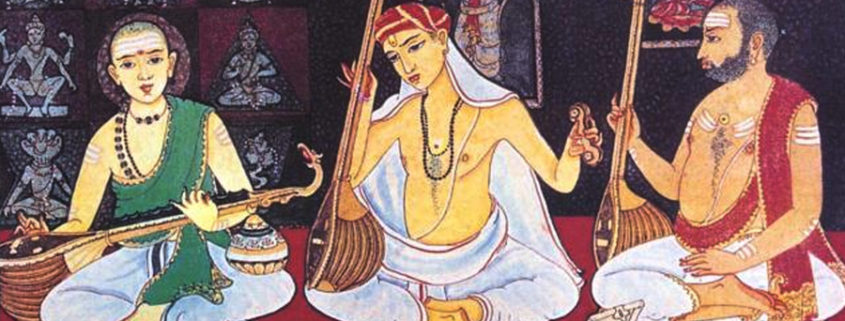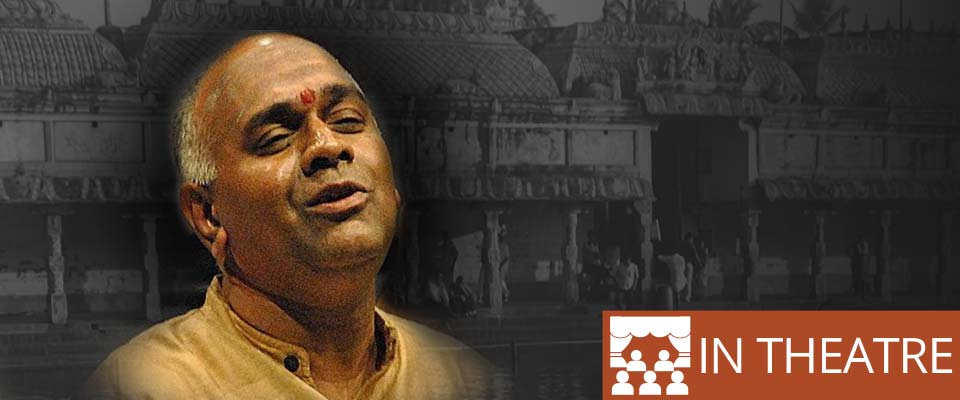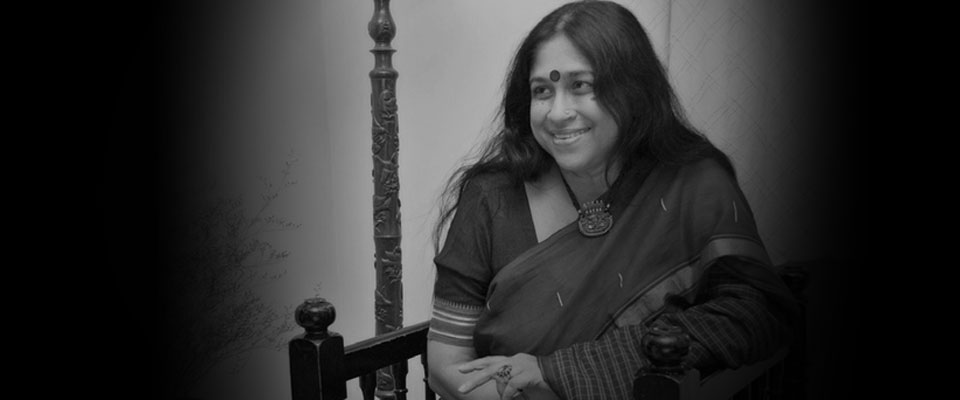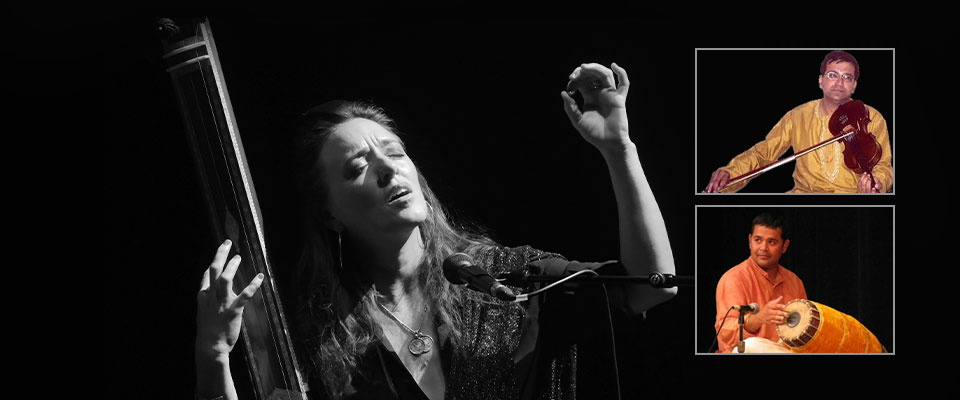Although there are a great many well known composers of Carnatic music, it is customary to think of them as being pre and post “Trinity” which is the term by which Tyagaraja, Muthuswami Dikshitar and Syama Sastri have collectively come to be known.
Purandara Dasa (1491–1564) is known as the father (Pitamaha) of Carnatic music because of his pioneering contributions. Purandara Dasa is known for formulating the basic lessons of Carnatic music. He structured graded exercises known as Swaravalis and Alankaras and introduced the Raga Mayamalavagowla as the first scale to be learned by beginners. He also composed many simple Gitams (songs) till which are taught to students to the present day.
The contemporaries Tyagaraja (1759? – 1847), Muthuswami Dikshitar, (1776–1827) and Syama Sastri, (1762–1827) are regarded as the Trinity of Carnatic music because of the quality of their compositions and the influence they had on the development and performance of Carnatic music. Being contemporaries, they have met and have even collaborated. The influence of royal patronage, history and culture led to Telugu and Sanskrit being the main languages for their compositions. Through the influence of the powerful and evocative poetry in their music, Carnatic Music came to be primarily a vocal music form and instrumentalists play the same compositions that are sung by vocalists. There is not a separate tradition of composing instrumental music.
Composers of Carnatic music were usually scholars proficient in one or more of the languages Kannada, Malayalam, Sanskrit, Tamil and Telugu. They usually included a signature, called a mudra, in their compositions. For example, all songs by Tyagaraja (who composed in Telugu) have the word Tyagaraja in them, all songs by Muthuswami Dikshitar (who composed in Sanskrit) have the words Guruguha in them, songs by Syama Sastri (who composed in Telugu) have the words Syama Krishna in them, while Purandaradasa, who composed in Kannada, used the signature Purandara Vittala. Gopalakrishna Bharathi used the signature Gopalakrishnan and composed in Tamil. Papanasam Sivan, also composed in Tamil as well as Sanskrit, and used the signature Ramadasan.
Due to the absence of complete historical records and manuscripts, there is some measure of controversy surrounding the dates and numbers of compositions attributed to the Trinity and pre-trinity era composers. There is also controversy and disagreement about the authenticity of certain compositions attributed to these composers. The dates and the numbers of compositions in the table below cannot be easily verified.
Pre-Trinity Composers (Before 18th Century)
|
Composer |
Years |
Languages |
Approx. Number of Compositions |
Other Info |
| Akka Mahadevi | 12th century | Kannada | ||
| Annamacharya | 1408 – 1503 | Telugu, Sanskrit | 50,000 | |
| Arunachala Kavi | 1711 – 1788 | Tamil | ||
| Arunagirinathar | 15th century | Tamil | Composed Tiruppugazh | |
| Basavanna | 12th century | Kannada | Composed Vachanagalu | |
| Jayadeva | 12th century | Sanskrit | 50 | Composed Geetha Govindam |
| Bhadraachala Raama daasu | 1620 – 1688 | Telugu | 500 | |
| Kshetragna | 1600 – 1680 | Telugu | 100 | |
| Marimutthu Pillai | 1717 – 1787 | Tamil | ||
| Muthu Thandavar | 1525 – 1625 | Tamil | ||
| Narayana Teertha | 1650 – 1745 | Telugu, Sanskrit | 200 | Composed Krishna leelaa Tarangini |
| Paidala Gurumurti Sastri | 17th century | Telugu | ||
| Papanasa Mudaliar | 1650 – 1725 | Tamil | ||
| Purandara Daasaru | 1491 – 1564 | Kannada, Sanskrit | 50,000 | |
| Sarangapani | 17th century | Telugu | ||
| Sripadaraya | 1404 – 1502 | Kannada |
Trinity-Age Composers (18th Century)
These composers lived during the time of the Trinity and there are recorded instances of their interaction with the Trinity.
|
Composer |
Years |
Languages |
Approx. Number of Compositions |
Other Info |
| Ghanam Krishna Iyer | 1790 – 1854 | Telugu | ||
| Iraiyamman Tampi | 1782 – 1856 | Malayalam, Sanskrit | ||
| Kavi Kunjara Bharati | 1810 – 1896 | Tamil | ||
| Muthuswami Dikshitar | 1775 – 1835 | Sanskrit, Mani Pravaalam | 400 | |
| Oottukkadu Venkata Kavi | 18th century | Sanskrit, Tamil | 200 | |
| Pacchimiriam Adiyappa | 18th century | Telugu | ||
| Thanjavur Quartet | 18th century | Sanskrit, Tamil | ||
| Tiruvarur Ramaswami Pillai | 1798 – 1852 | Tamil | ||
| Thyagaraja Swami | 1767 – 1847 | Telugu, Sanskrit | 50,000 | |
| Sadasiva Brahmendra | 18th century | Sanskrit | ||
| Syama Sastri | 1762 – 1827 | Telugu | 400 |
Post-Trinity Composers – 19th Century
|
Composer |
Years |
Languages |
Approx. Number of Compositions |
Other Info |
| Subramaniya Bharathiyar | 1882 – 1921 | Tamil,Sanskrit | ||
| Annamalai Reddiyar | 1865 – 1891 | |||
| Anai Ayya brothers | 19th Century | Telugu | 20 | |
| Dharmapuri Subbarayar | 19th century | Telugu | 50 | Composed many Jaavalis |
| Ennappadam Venkatarama Bhagavatar | 1880 – 1961 | |||
| Gopalakrishna Bharathi | 1811 – 1896 | Tamil | 50 | |
| Koteeswara Iyer | 1870 – 1940 | Tamil, Sanskrit | 200 | Composed in all 72 Melakarta raagas |
| Kurainadu Natesa Pillai | 1830 – 1925 | |||
| Krishnarajendra Wodeyar III | 1799 – 1868 | Sanskrit, Kannada | ||
| Maha Vaidyanatha Iyer | 1844 – 1893 | Sanskrit | 100 | Composed 72-Melakarta raaga maalika |
| Manambuchavadi Venkatasubbayyar | 19th century | Telugu | 50 | Desciple of Thyagaraja |
| Mayuram Viswanatha Sastri | 1893 – 1958 | Telugu, Sanskrit | 50 | |
| Muthiah Bhagavatar | 1877 – 1945 | Telugu, Sanskrit | 200 | |
| Mysore Sadasiva Rao | b. 1790 | Telugu, Sanskrit | 100 | |
| Mysore Vasudevacharya | 1865 – 1961 | Telugu, Sanskrit | 250 | |
| Neelakanta Sivan | 1839 – 1900 | Tamil | 100 | |
| Pallavi Seshayyar | 1842 – 1905 | Telugu | ||
| Papanasam Sivan | 1890 – 1973 | Tamil, Mani Pravaalam | 300 | |
| Patnam Subramania Iyer | 1845 – 1902 | Telugu | 100 | |
| Pattabhiramayya | 19th century | |||
| Poochi Srinivasa Iyengar | 1860 – 1919′ | Telugu | 100 | |
| Subbarama Dikshitar | 1839 – 1906 | Telugu | 50 | |
| Subbaraya Sastri | 1803 – 1862 | Telugu | 100 | Son of Syama Sastri |
| Swati Tirunal | 1813 – 1847 | Sanskrit, Hindi, Malayalam, Mani Pravaalam | 200 | |
| Tiruvottriyur Tyagayyar | 1845 – 1917 | Tamil | 50 | |
| Veena Kuppayyar | 1798 – 1860 | Telugu | 100 | Desciple of Thyagaraja |
Post-Trinity Composers – 20th Century
|
Composer |
Years |
Languages |
Approx. Number of Compositions |
Other Info |
| Dandapani Desikar | 1908 – 1972 | 55 | ||
| GN Balasubramaniam | 1910 – 1965 | Sanskrit, Telugu, Tamil | 90 | |
| K. R. Kedaranathan | 1925 – 2007 | |||
| Lalgudi Jayaraman | b. 1930 | 30 | ||
| Maharajapuram Santhanam | ||||
| M. Balamuralikrishna | b. 1930 | Telugu, Sanskrit | 200 | Composed in all 72 Melakarta raagas |
| M. D. Ramanathan | 1923 – 1984 | Sanskrit | 300 | |
| Mysore V. Ramarathnam | 1917 – 2008 | |||
| L. Subramaniam | b. 1947 | |||
| N. Ramani | b. 1934 | 10 | ||
| N. Ravikiran | b. 1967 | Sanskrit, Tamil | 50 | |
| Ganam (Ganasaraswathy) | ‘ | Tamil, Sanskrit, Mani Pravaalam | 600 | http://www.ganam.org |
| Nallan Chakravartula Krishnamaachaaryulu | 1925 – 2006 | Sanskrit | 30 | |
| Periyasaamy Thooran | 1908 – 1987 | Tamil | 305 | |
| S. Ramanathan | 1917 – 1988 | Tamil | 50 |
Other Composers
- Rallapalli Anantha Krishna Sharma (1893 – 1979) [1]
- K.M. Soundaryavalli (July 22, 1914 – October 8, 1994)
- Mangalam Ganapathy
- N. S. Ramachandran
- Tanjavur Sankara Iyer
- K. R. Kumaraswamy Iyer
- Tanjavur S.Kalyanaraman
- Tirupati Narayanaswami Naidu
- Kadaloor M. Subramaniam
- Sri Swami Dayananda Saraswati
- Ragasri Kumaramangalam Srinivasaraghavan
Other Composers in the Mysore Kingdom
- Vaikunta Dasaru (1680)
- Veena Venkata Subbiah (1750)
- Shunti Venkataramaniah (1780)
- Aliya Lingaraja Urs (1823 – 1874)
- Chinniah (1902)
- Krishnappa
- Veena Chikka Lakshminaranappa
- Veene Krishnappa
- Piteelu Seenappa
- Bhairavi Lakshminaranappa (1878 – 1934)
- Pedda Lakshminaranappa
- Devalapurada Nanjunda
- Veena Shamanna (1832 – 1908)
- Veena Padmanabiah (1842 – 1900)
- Veene Sheshanna (1852 – 1926)
- Mysore Karigiri Rao (1853 – 1927)
- Veena Subbanna (1861 – 1939)
- Bidaram Krishnappa (1866 – 1931)
- Tiruppunandal Pattabhiramiah (1863)
- Sosale Ayya Shastry (1854 – 1934)
- Rallapalli Anantha Krishna Sharma (1893 – 1979)
- Jayarayacharya (1846–1906)
- Giribhattara Tammayya (1865 – 1920)
- Nanjangud Subba Shastry (1834 – 1906)
- Chandrashekara Shastry
- Veena Subramanya Iyer (1864 – 1919)
- Veena Shivaramiah (1886 – 1946)
- Veena Venkatagiriappa (1887 – 1952)
- Belakawadi Srinivasa Iyengar (1888 – 1952)
- Chikka Ramarao (1891 – 1945)
- Mysore T. Chowdiah (1894 – 1967)
- Jayachamaraja Wodeyar (1919 – 1974)
- Dr. B. Devendrappa (1899 – 1986)
- Gotuvadyam Narayana Iyengar (1903 – 1959)
- Tiruvayyar Subramanya Iyer
- Anavatti Rama Rao (1860)
- Tiger Varadachariar (1876 – 1950)
- Chennakeshaviah (1895 – 1986)
- Titte Krishna Iyengar (1902 – 1997)
- S.N. Mariappa (1914 – 1986)
- Chintalapalli Ramachandra Rao (1916 – 1985)
- R.N.Doreswamy (1916 – 2002)
- H.M. Vaidyalinga Bhagavatar (1924 – 1999)
- Bellary M Seshagiri Achar (1935 – 1985)
Other Composers – The Bhakti Saints
In addition to the above composers, various Bhakti saints of medieval India also composed devotional hymns, verses and songs. These compositions, though strictly not of Carnatic or classical character, have contributed to the gradual evolution of the Carnatic musical tradition over the centuries. the Bhakti movement continued to be a strong influence in Carnatic music through the ages and to this day; both in compositions and in performance.
- Karaikkal Ammeiyar (5th century)
- Thirunavukkarasar (7th century)
- Thirugnana Sambanthar (7th century)
- Sundaramurti (7th century)
- Andal (9th century)
- Manikkavasagar (10th century)
- Allama Prabhu (12th century)
- Muthu Thandavar (14th century)
- Vyasatirtha (1460 &nadsh; 1539)
- Vadirajatirtha (1480 – 1600)
- Narayana Teertha (1580 – 1660)
- Kanakadasa (1509 – 1609)
- Raghavendra Swami (1595 – 1671)
- Mahipathidasa (1611 – 1681)
- Vijaya Dasa (1682 – 1755)
- Prasanna Venkatadasa (1680 – 1752)
- Gopaladasa (1722 – 1762)
- Jagannathadasa (1727 – 1809)
- Praneshadasa (1736 – 1822)
- Venugopaladasa (1728 – 1751)
- Mohanadasa (1728 – 1751)
- Helevanakatte Giriamma (18th century)
- Harapanhalli Bhimavva (1822 – 1903)
- Guru Jagananatha Dasa (1837 – 1918)
Much of this content is provided or derived from Wikipedia. The text is available under the Creative Commons Attribution-Share Alike License .






